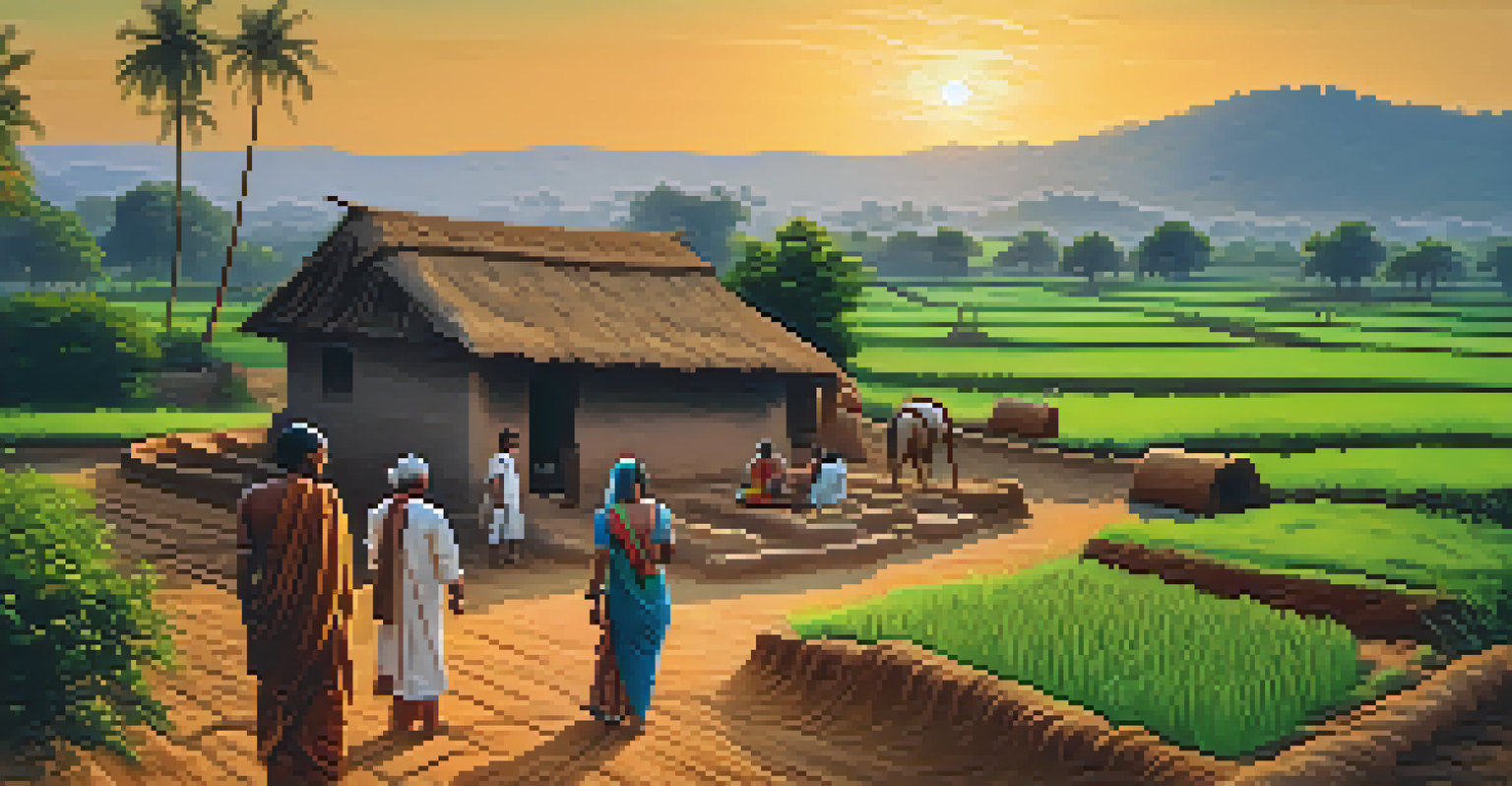Genealogy Unveiled: Exploring Family History in India

Understanding Genealogy: What It Means for Families
Genealogy is the study of families, tracing their lineages and history over generations. It's like being a detective, piecing together clues from birth records, marriage licenses, and old photographs to uncover the stories of our ancestors. In India, where family ties run deep, genealogy can reveal not just names but also the cultural heritage that shapes our identities.
Genealogy is a window to the past, a bridge to the present, and a guide to the future.
Many people embark on this journey to learn about their roots, seeking a connection with the past. For example, discovering that your great-grandmother was a freedom fighter can instill a sense of pride and belonging. This quest for knowledge often leads to unexpected surprises, such as uncovering long-lost relatives or family traditions that have faded over time.
With advancements in technology, genealogy has become more accessible. Online databases and DNA testing services allow individuals to explore their familial connections without the need to travel extensively. This democratization of information means anyone can become their own family historian, making the process both exciting and rewarding.
The Role of Oral Traditions in Indian Genealogy
In India, oral traditions play a crucial role in preserving family histories. Stories passed down through generations often contain valuable information about ancestors, their lives, and their experiences. Listening to elders recounting tales can provide context and meaning that written records sometimes lack.

For instance, a grandmother might share stories about her childhood, hinting at family occupations or migration patterns. These narratives can be rich with details, such as the values and customs that shaped the family. By gathering these stories, one can create a more holistic view of their ancestry.
Genealogy Connects Us to Our Roots
Studying genealogy allows individuals to explore their family history and cultural heritage, fostering a sense of identity and belonging.
Moreover, oral traditions can sometimes fill in the gaps left by official documentation. In rural areas, where record-keeping may not be as stringent, family lore can be the key to piecing together a family tree. This highlights the importance of actively engaging with family members to collect and preserve these precious stories.
Utilizing Technology for Family History Research
Technology has revolutionized the way we explore genealogy. Online platforms like Ancestry.com and MyHeritage provide access to vast databases of historical records, making it easier to trace family trees. These resources can be especially helpful for Indians who may have relatives spread across different countries.
To know where you come from is to know where you are going.
Additionally, social media platforms allow individuals to connect with distant relatives and share their findings. Imagine discovering a cousin you never knew existed, all thanks to a family tree you built online. This sense of community can provide support and encouragement as you navigate your genealogical journey.
Moreover, DNA testing has opened up new avenues for uncovering family history. By analyzing genetic markers, individuals can discover their ethnic backgrounds and even connect with relatives they may not have known about. It's like a modern-day treasure hunt that can deepen your understanding of who you are and where you come from.
Exploring Regional Variations in Indian Genealogy
India's diverse cultural landscape means that genealogy can vary significantly from region to region. Each community has its own customs, traditions, and methods of tracking lineage, often influenced by language and religion. This makes exploring family history in India a richly layered experience.
For example, in South India, the practice of recording family history often involves maintaining 'kula deivam' or family deities, which can provide insights into ancestral worship practices. In contrast, North Indian families might focus on caste and clan affiliations, which play a significant role in their identity.
Oral Traditions Enrich Family Histories
In India, oral stories passed down through generations provide crucial context and details that complement official records in genealogical research.
These regional nuances not only shape how families document their histories but also how they celebrate them. Understanding these variations can enhance your genealogical research, offering a more detailed picture of your family's past and its cultural significance.
Challenges in Tracing Indian Ancestry
While exploring genealogy can be rewarding, it also comes with its challenges, particularly in India. One significant hurdle is the lack of comprehensive and accessible records. Many families may not have maintained detailed documentation, making it difficult to trace lineage accurately.
Moreover, historical events such as partition and migration can complicate family histories. For instance, families that moved across borders may have lost contact with their roots, leaving gaps in their genealogical records. These disruptions can make the journey of discovery both complex and emotional.
Finally, language barriers can pose additional challenges, especially when dealing with old documents written in regional scripts. It may require patience and persistence to decode records, but the journey is often worth the effort as it leads to a deeper understanding of one's heritage.
The Importance of Documenting Family Histories
Documenting family histories is crucial not only for preserving memories but also for future generations. Creating a family tree or writing down stories ensures that the rich tapestry of one’s ancestry is not lost over time. It’s like planting a seed that future generations can nurture and grow.
By putting together a family history, you provide your children and grandchildren with a sense of belonging. They can learn about their ancestors' struggles and triumphs, fostering a sense of pride and continuity. Sharing these stories can also strengthen family bonds as members come together to celebrate their shared heritage.
Technology Transforms Genealogy Research
Advancements in technology, including online databases and DNA testing, have made genealogy more accessible, enabling people to uncover their ancestral connections easily.
Moreover, in today's globalized world, understanding one's roots can help in forming personal identity. It can guide decisions, influence values, and even impact how we connect with others. By documenting family histories, individuals contribute to a collective legacy that enriches the entire family.
Joining Genealogy Groups and Communities in India
Connecting with like-minded individuals can significantly enhance your genealogy journey. In India, various groups and communities focus on genealogy, offering resources, support, and camaraderie. These organizations often host workshops, seminars, and online forums, making it easier to share knowledge and experiences.
For example, attending a local genealogy workshop can provide insights into research techniques, record-keeping practices, and even DNA testing. Hearing from experts and experienced genealogists can inspire you to dig deeper into your family history. Plus, you might meet others who share your enthusiasm for uncovering the past.

Additionally, online communities can be an invaluable resource. Platforms like Facebook or dedicated genealogy websites allow you to connect with individuals from diverse backgrounds, each with their own stories to tell. This network can be a source of support, offering guidance and encouragement as you navigate your genealogical research.
The Future of Genealogy in India: Trends and Innovations
As we look to the future, the field of genealogy in India is poised for exciting developments. The integration of artificial intelligence and big data into genealogy research promises to streamline the process of building family trees and analyzing historical records. These technologies can help identify patterns and connections that may have gone unnoticed.
Moreover, the rise of community-driven genealogical projects can foster collaboration and knowledge sharing. By pooling resources and expertise, families can work together to create comprehensive family histories that benefit everyone involved. This collective approach enhances the accuracy and richness of genealogical research.
Lastly, as interest in ancestry continues to grow, educational institutions may start offering courses in genealogy, encouraging more individuals to explore their family histories. This growing trend indicates that genealogy will become an integral part of understanding identity and heritage in India, bridging the past with the future.